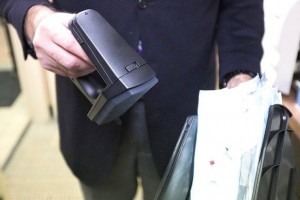Canada's Great Lakes Orthopaedic Hospital uses Xerafy medical labels to manage surgical instruments
Time:2015-12-03
Ensuring the strict management of hospital surgical instruments is closely related to the safety of patients, which is also a concern of all medical institutions. Retired nurse Carol Schmucker recalls that hospitals often have accidents in which surgical instruments are lost, misplaced, or thrown away in bed sheets, or even left behind in patients. Although the surgical procedure will require the nurse to count the instruments before and after surgery, human error is inevitable.
Ensuring the strict management of hospital surgical instruments is closely related to the safety of patients, which is also a concern of all medical institutions. Retired nurse Carol Schmucker recalls that hospitals often have accidents in which surgical instruments are lost, misplaced, or thrown away in bed sheets, or even left behind in patients. Although the surgical procedure will require the nurse to count the instruments before and after surgery, human error is inevitable.

Faced with these urgent problems, Schmucker decided to start using advanced systems to manage surgical instruments to ensure patient safety. The hospital selected the Surgical Safety System developed by Surgical Safety Scanner and installed Xerafy RFID medical labels on each surgical instrument. These patented labels are very small and small enough to be attached to the surgery. The device does not affect the doctor's use. This surgical instrument tracking technology is different from the bar code or other types of RFID tags used in the past. The tag can withstand the medical disinfection environment. Whether it is high temperature and high pressure steam sterilization or chemical cleaning, the labels installed on the device are not affected at all. The system is equipped with a hand-held tag reader for easy operation. It is convenient for group reading or single reading of each instrument. The staff can scan and clean the labels in the blue. It takes only a few seconds to know the number of instruments in the basket. Every occasion where the device is used is properly controlled. Through the automated system, the inventory of surgical instruments saves a lot of time, improves the rate of surgical turnover, and improves the efficiency of the use of surgical instruments in hospitals, reducing the rate of loss of equipment.
“If you label your surgical instrument, you won't be able to find it. You can also check the instrument usage record by scanning the label. Even new employees can visually see the information of the device without looking at the list.” Schmucker said.
Pdiatrist Jeff Szczepanski is the owner of the Foot Ankle Specialist Hospital. According to him, this surgical device management system hospital has been used for several months and the effect is very good. The new technology has saved him the cost of equipment replacement and improved medical services. quality.
Medical device management has clear regulations throughout the medical industry legal regulations. For example, in order to avoid medical malpractice, JCAHO has developed a general protocol to avoid inappropriate operation and error demonstration in the surgical procedure. This protocol also specifies surgery. A standard list of equipment inventory. Hospital administrators and nurses hope to use RFID systems in all clinics, operating rooms, and disinfection supply rooms. This is responsible for patients.
Related News
In order to further strengthen the supervision of the importation of imported medical devices after the listing, the State Food and Drug Administration recently organized an overseas inspection of the production quality management system for some overseas manufacturers of medical devices exported to China.
2022-04-15
The first chapter is a total of six articles. The purpose of legislation, scope of application, regulatory authority, establishment of quality management system for medical device users, and responsibility for quality management of medical devices used by the unit are clarified.
2022-04-15
In the communiqué of the Fifth Plenary Session of the 18th Central Committee
However, some experts said that if we want to enjoy this huge cake, we still need to go more. At this stage, there is still a big gap between the industrial chain integration of China's medical industry and other developed countries.
2022-04-15
Service Hotline
Tel:+86-519-86380098
Email:nanxiang@cznanxiang.cn
Address: No. 22, Changyang Road, Wujiang Economic Development Zone, Jiangsu Province
© 2025 Changzhou Nanxiang Medical Device Co., Ltd. ALL Rights Reserve. www.300.cn

